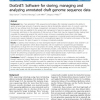Free Online Productivity Tools
i2Speak
i2Symbol
i2OCR
iTex2Img
iWeb2Print
iWeb2Shot
i2Type
iPdf2Split
iPdf2Merge
i2Bopomofo
i2Arabic
i2Style
i2Image
i2PDF
iLatex2Rtf
Sci2ools
132
click to vote
BMCBI
2010
2010
DraGnET: Software for storing, managing and analyzing annotated draft genome sequence data
Background: New "next generation" DNA sequencing technologies offer individual researchers the ability to rapidly generate large amounts of genome sequence data at dramatically reduced costs. As a result, a need has arisen for new software tools for storage, management and analysis of genome sequence data. Although bioinformatic tools are available for the analysis and management of genome sequences, limitations still remain. For example, restrictions on the submission of data and use of these tools may be imposed, thereby making them unsuitable for sequencing projects that need to remain in-house or proprietary during their initial stages. Furthermore, the availability and use of next generation sequencing in industrial, governmental and academic environments requires biologist to have access to computational support for the curation and analysis of the data generated; however, this type of support is not always immediately available. Results: To address these limitations, ...
Related Content
| Added | 08 Dec 2010 |
| Updated | 08 Dec 2010 |
| Type | Journal |
| Year | 2010 |
| Where | BMCBI |
| Authors | Stacy Duncan, Ruchita Sirkanungo, Leslie Miller, Gregory J. Phillips |
Comments (0)

